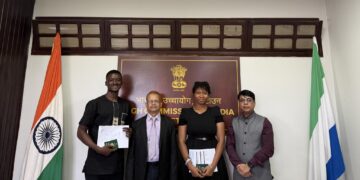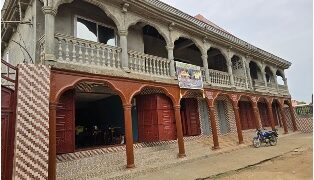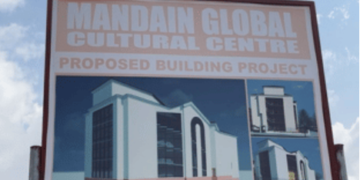By Alpha Amadu Jalloh
Mr. President, can we talk? Today, I address you and, by extension, every Sierra Leonean with a matter of profound consequence: our country’s constitutional future. There is a committee convened under the banner of constitutional review, a body cloaked in secrecy, its operations hidden behind a wall of opacity that leaves us, the people, and even your political opponents in the dark. How can a nation, proud of its independent spirit and democratic ideals, be expected to stand by silently while its guiding document is redrafted behind closed doors?
The Constitutional Review Committee (CRC) is, by its very name, meant to evoke transparency, accountability, and participation. Yet, from its inception to its current secretive functioning, the committee appears shrouded in mystery. Mr. President, the people have a right to know: Who are the members of this CRC? On what basis were they chosen? How can we trust that the revised constitution will stand the test of time if we are not given even a glimpse of the minds and values shaping it?
For decades, our constitution, crafted in 1991, has been the beacon of Sierra Leone’s democracy. It is a document that has guided us through trials and triumphs. However, as you set the stage for its review, questions are mounting. The composition of the CRC and the true intentions behind its formation have become subjects of speculation. Some whisper that the moves being made by your government are not solely about modernization or adaptation to current challenges, but about a more disquieting goal: a bid to secure a third term.
Mr. President, you would hardly be pleased if I suggested that your actions smacked of the “You after You Idea,” which is a dangerous proposition that many see as a prelude to an unprecedented concentration of power. History is replete with examples where leaders, once they overstep constitutional limits, drift down a slippery slope towards authoritarianism. The very notion of extending your mandate beyond the time-honoured limits enshrined in our constitution should set off alarm bells among every Sierra Leonean who cherishes democratic governance.
It is not just the mystery surrounding the CRC that worries us. There is growing concern that the slew of legislative bills introduced by your administration, championed by loyal minions in Parliament, serve not as measures to strengthen our democracy, but rather as tools designed to police the opposition and stifle dissent. These legislative actions, seemingly launched in quick succession, raise the disturbing possibility that they are all part of a broader strategy to consolidate power. If the constitutional review process is merely one piece in this jigsaw puzzle, then what remains of the democratic ideals we hold so dear?
Our country prides itself on being independent, a nation whose laws are not dictated by the whims of any one leader but are the product of a collective will, reflected in an open and participatory process. Therefore, any attempt to review or amend the constitution must involve not just the government, but also civil society, political opposition, and the citizens at large. The 1991 constitution belongs to the people, and its revision should be a process that engages every Sierra Leonean. A top-down approach, shrouded in secrecy, is not only undemocratic but also likely to sow the seeds of discord and division.
Adding to the controversy is the alarming plan to incorporate the revised constitution into the electoral process as a referendum. The idea that voters might be asked to endorse a constitution they have not had adequate opportunity to study, debate, or even understand is deeply troubling.
A referendum is meant to be a genuine exercise in democratic engagement, a chance for the people to weigh in on matters that affect their lives profoundly. However, when the very framework of that engagement is manipulated, when the document to be voted on is hidden behind layers of secrecy and political maneuvering, the legitimacy of the process itself comes into question.
The political landscape in Sierra Leone today is fraught with tension. Reports suggest that even the opposition has been rendered silent on the issue of the CRC, a silence that speaks volumes. It is no secret that many believe you have co-opted or bought the support of key opposition figures and civil society leaders. The result is a political environment where genuine debate and dissent are stifled, leaving us with a façade of consensus that conceals underlying autocratic ambitions. When those entrusted with safeguarding our democratic processes begin to serve partisan interests, the whole nation suffers.
Let us also turn our attention to other legislative measures that are on the horizon, bills that, on the surface, promise to address pressing issues but may, in fact, have ulterior motives. Consider the Abortion Bill, often framed under the guise of a Safe Motherhood initiative. While maternal health is undeniably important, the way this bill is being positioned suggests that it might be used as a lever to control women’s rights and limit reproductive freedoms. The introduction of such a bill without broad public consultation undermines the democratic principles that should be at the heart of any legislation.
Then there is the Anti-Terrorism Bill, a piece of legislation that, under normal circumstances, might be welcomed as a tool to ensure national security. However, its timing and context raise serious concerns. When a government seeks to expand its powers in the name of security, there is always the risk that these powers will be abused. History has taught us that laws designed to counter terrorism can easily morph into instruments of political repression. Given the current climate of political tension and the drive toward further centralization of power, the Anti-Terrorism Bill appears less a safeguard for national security and more a pretext for cracking down on political opposition.
And looming on the horizon is yet another contentious piece of legislation, the LGBTQ+ Bill. In a world that is increasingly embracing diversity and human rights, any move that seeks to bring or legalize LGBTQ+ communities is a step backwards. This bill, if enacted, could mark a dramatic regression in our commitment to our cultures, traditions, and religious beliefs as Sierra Leoneans. Its introduction, too, seems to coincide with a broader agenda of satisfying the Americans all in the name of securing the MCC. “Da Money Dae Amerika Nor Dae Gi Yu”
Mr. President, the pattern is unmistakable. There is a deliberate series of actions, ranging from the secretive constitutional review to the introduction of bills that could potentially be used to marginalize opposition voices, that together form a coherent strategy aimed at altering the very fabric of our democracy. The people of Sierra Leone deserve to know the truth. They deserve to have a say in the decisions that will shape the future of our nation.
Democracy thrives on transparency, accountability, and participation. Without these pillars, even the most carefully constructed legal frameworks can crumble under the weight of unchecked power. Our constitution is not merely a legal document; it is a social contract between the government and its citizens. It embodies our collective aspirations, our struggles, and our unwavering commitment to the principles of justice and freedom. When this contract is
renegotiated in secret, when its terms are dictated by a select few rather than debated by the many, the very legitimacy of our democratic system is called into question.
It is time for a new approach, one that reaffirms our commitment to democratic values and the rule of law. The process of constitutional review must be conducted in an open, inclusive manner that invites the participation of all stakeholders. The members of the Constitutional Review Committee must be revealed, their qualifications scrutinized, and their mandates clearly defined. Only then can we begin to rebuild the trust that has been eroded by secrecy and suspicion.
Moreover, Mr. President, any proposals to amend the constitution or introduce new bills must be accompanied by robust public debate. The people of Sierra Leone should not be passive recipients of policies crafted in the corridors of power. Instead, they must be active participants in shaping the laws that govern their lives. This is not a time for silence or complacency. It is a time for vigorous, informed debate, a time for every Sierra Leonean to demand that their rights and freedoms be respected.
Let this be a clarion call to all those who believe in the ideals of democracy and good governance. We must resist any attempt to centralize power in the hands of a few, to manipulate our institutions for partisan gain, or to rewrite the rules of our democracy without the consent of the governed. Mr. President, can we talk today, not behind closed doors or in hushed tones, but openly, honestly, and directly with the people you serve?
The future of Sierra Leone depends on the decisions we make today. If we allow secrecy and autocracy to take root, the democratic gains of decades will be swept away in the tide of repression. Instead, let us seize this moment to reaffirm our commitment to transparency, accountability, and the rule of law. Let us ensure that every citizen, regardless of their political affiliation, has a voice in the process of shaping our nation’s destiny.
In the coming weeks and months, as debates rage over the proposed bills and the fate of the constitutional review, let us not be divided by fear or suspicion. Rather, let us come together as a nation united by our shared values and our common desire for a just and equitable society. The conversation must continue, not just among politicians and policymakers, but among all Sierra Leoneans.
Mr. President, we stand at a crossroads. One path leads to further concentration of power, curtailment of freedoms, and the erosion of the democratic principles we hold dear. The other path, though fraught with challenges, promises a future where transparency, accountability, and public participation are not mere slogans but the very foundation of our governance. The choice is yours. The choice is ours.
In this pivotal moment, we call on you to break the silence. Reveal the membership of the Constitutional Review Committee. Open the doors of discussion and debate. Allow the people of Sierra Leone to engage with the process that will determine the future of our nation. Because if we are to build a country that stands the test of time, it must be built on a foundation of trust, openness, and the unwavering commitment to democracy.
Mr. President, can we talk? The conversation must begin now, before it is too late.






















